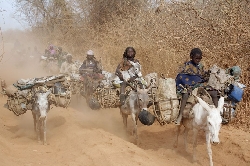
Contact: Médecins Sans Frontières, +41 (22) 849.84.00
GENEVA, June 8 /Standard Newswire/ -- While Darfur is the centre of intense political focus - humanitarian corridors from Chad, etc. - that is little related to the reality in the field, in Chad 150,000 IDPs are caught up in a growing humanitarian crisis.
Photo: Some 150,000 internally displaced persons (IDPs) lack assistance. MSF aid is hindered; © Olivier Jobard/Sipa Press
Although an MSF survey has confirmed the emergency situation, assistance is still largely insufficient and MSF is coming up against numerous obstacles to increasing its activities.
In eastern
Epicentre, MSF's research and epidemiological survey centre, carried out a survey at the end of May in the camps around Goz Beida. This survey revealed that one child in five was suffering from acute malnutrition and that the mortality rates from March 30 to May 20, 2007, were catastrophic.
Until recently, the assistance provided by many organisations in
"In Goz Beida, the IDPs receive three to eight litres of water per person per day, whereas they should have 20 litres. Only around 100 malnourished children are receiving treatment, but our survey estimated at least 2,000 children suffering from acute malnutrition," explained Franck Joncret, MSF Head of Mission in
MSF is present in Dogdore, Goz Beida, Ade, Koukou and Kerfi and is extending is activities. In certain localities however, MSF is facing considerable obstacles. Despite repeated requests, MSF is still being refused authorisation to open a paediatric hospital in Goz Beida, which would focus in particular on treating malnourished children.
There will be an increase in malaria cases and epidemic diarrhoeal diseases during the rainy season which starts at the end of the month. We also fear a significant increase in malnutrition. Given the foreseeable deterioration in the situation it is urgent, in order to avoid a catastrophe, to increase hospitalisation capacity, improve the water supply and respond to the nutritional problems.
"It is imperative that the emergency in eastern




 Sign Up to Receive Press Releases:
Sign Up to Receive Press Releases: